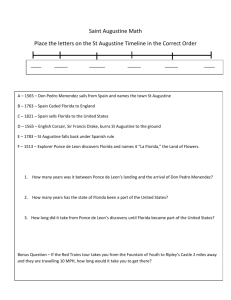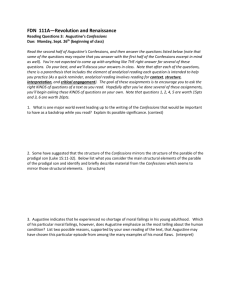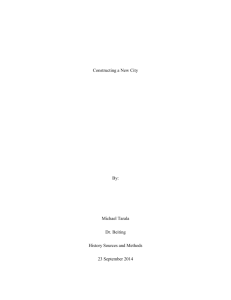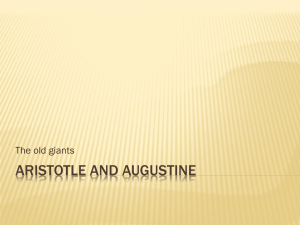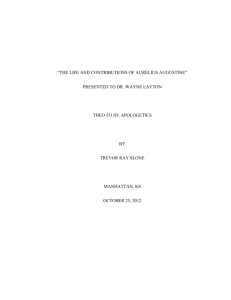Augustine, On Christian Teaching - Foundation for Reformed Theology
advertisement
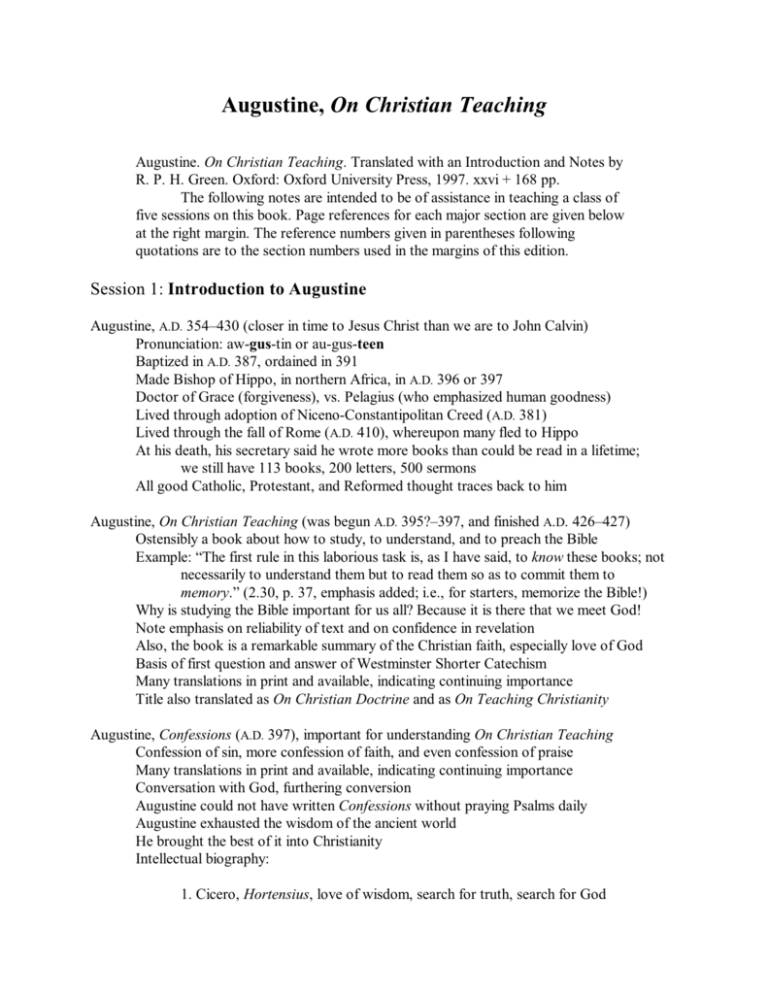
Augustine, On Christian Teaching Augustine. On Christian Teaching. Translated with an Introduction and Notes by R. P. H. Green. Oxford: Oxford University Press, 1997. xxvi + 168 pp. The following notes are intended to be of assistance in teaching a class of five sessions on this book. Page references for each major section are given below at the right margin. The reference numbers given in parentheses following quotations are to the section numbers used in the margins of this edition. Session 1: Introduction to Augustine Augustine, A.D. 354–430 (closer in time to Jesus Christ than we are to John Calvin) Pronunciation: aw-gus-tin or au-gus-teen Baptized in A.D. 387, ordained in 391 Made Bishop of Hippo, in northern Africa, in A.D. 396 or 397 Doctor of Grace (forgiveness), vs. Pelagius (who emphasized human goodness) Lived through adoption of Niceno-Constantipolitan Creed (A.D. 381) Lived through the fall of Rome (A.D. 410), whereupon many fled to Hippo At his death, his secretary said he wrote more books than could be read in a lifetime; we still have 113 books, 200 letters, 500 sermons All good Catholic, Protestant, and Reformed thought traces back to him Augustine, On Christian Teaching (was begun A.D. 395?–397, and finished A.D. 426–427) Ostensibly a book about how to study, to understand, and to preach the Bible Example: “The first rule in this laborious task is, as I have said, to know these books; not necessarily to understand them but to read them so as to commit them to memory.” (2.30, p. 37, emphasis added; i.e., for starters, memorize the Bible!) Why is studying the Bible important for us all? Because it is there that we meet God! Note emphasis on reliability of text and on confidence in revelation Also, the book is a remarkable summary of the Christian faith, especially love of God Basis of first question and answer of Westminster Shorter Catechism Many translations in print and available, indicating continuing importance Title also translated as On Christian Doctrine and as On Teaching Christianity Augustine, Confessions (A.D. 397), important for understanding On Christian Teaching Confession of sin, more confession of faith, and even confession of praise Many translations in print and available, indicating continuing importance Conversation with God, furthering conversion Augustine could not have written Confessions without praying Psalms daily Augustine exhausted the wisdom of the ancient world He brought the best of it into Christianity Intellectual biography: 1. Cicero, Hortensius, love of wisdom, search for truth, search for God AUGUSTINE, ON CHRISTIAN TEACHING 2 2. Manicheeism: radical dualists Non-Judaistic, pre-Christian; Christian heretics, gnostics spiritual is good, material is evil Also, God is incorruptible, but fights evil Augustine became dissatisfied with this 3. Skepticism Augustine began to doubt his doubts 4. Ambrose, reading of Scriptures, especially allegorical interpretation I.e., avoided problems of Manicheeism’s literal readings Note: Augustine was a teacher of rhetoric, public speaking Much impressed by Ambrose’s preaching 5. Neoplatonism Forms, participation All things are real insofar as they have being Still, question of evil Whatever is, is good; evil is not a substance (doctrine of creation) Wickedness is a perversity of the will God is truth Platonists, immaterial truth “Grant me chastity and continence, but not yet.” [vs. Socrates, To know the good is to do it.]; i.e., problem of the will 6. Conversion to Christianity: Take and read (the Bible) Moral and personal conversion Augustine, City of God (A.D. 413–426) The popular faith that Rome was eternal was shattered by the fall of Rome, A.D. 410. Augustine wrote that the city of man (Rome) is passing, but the city of God is eternal. Many translations in print and available, indicating continuing importance Increasing interest to us during the decline of the western world Session 2: Preface pp. 3–7 “There are certain rules for interpreting the scriptures which, as I am well aware, can usefully be passed on to those with an appetite for such study to enable them to progress not just by reading the work of others who have illuminated the obscurities of divine literature [i.e., reading commentaries], but also by finding illumination themselves [see especially Books One through Three; Book Four has to do with sharing this illumination with others]. It is my intention to communicate these rules to those with the will and the wit to learn.” (1) AUGUSTINE, ON CHRISTIAN TEACHING Book One (The Process of Discovering: Things) 3 pp. 8–29 “There are two things on which all interpretation of scripture depends: the process of discovering what we need to learn [Books One through Three], and the process of presenting what we have learnt [Book Four].” (1, emphasis added; note throughout Augustine’s careful distinctions) “All teaching is teaching of either things or signs, but things are learnt through signs.” (4, emphasis added) “Every sign is also a thing, since what is not a thing does not exist. But it is not true that every thing is also a sign.” (5) “There are some things which are to be enjoyed, some which are to be used. . . . Those which are to be enjoyed make us happy; those which are to be used assist us and give us a boost, so to speak, as we press on towards our happiness, so that we may reach and hold fast to the things which make us happy. . . . If we choose to enjoy the things that are to be used, our advance is impeded and sometimes even diverted, and we are held back, or even put off, from attaining things which are to be enjoyed, because we are hamstrung by our love of lesser things.” (7, emphasis added; that this moves beyond interpretation of scripture to Christian faith and life) “To enjoy something is to hold fast to it in love for its own sake. To use something is to apply whatever it may be to the purpose of obtaining what you love.” (8, emphasis added) “The things which are to be enjoyed, then, are the Father and the Son and the Holy Spirit.” (10, emphasis added) Note that this teaching—in this very vocabulary—was carried forward more than 1200 years directly into the Westminster Shorter Catechism: Q. 1. What is the chief end of man? A. Man’s chief end is to glorify God, and to enjoy him forever. (emphasis added) Also, see Book One for a creed-like statement of the doctrine of Trinity (10–12). “Human beings must also be told how to love.” (54) “I am saying that we enjoy a thing which we love for itself, and that we should enjoy only a thing by which we are made happy, but use everything else.” (73, emphasis added) “So anyone who thinks that he has understood the divine scriptures or any part of them, but cannot by his understanding build up this double love of God and neighbour, has not yet succeeded in understanding them.” (86, emphasis added) AUGUSTINE, ON CHRISTIAN TEACHING Session 3: Book Two (The Process of Discovering: Unfamiliar Signs) 4 pp. 30–67 “A sign is a thing which of itself makes some other thing come to mind, besides the impression that it presents to the senses.” (1) “Some signs are natural, others given.” (2) “Given signs are those which living things give to each other, in order to show, to the best of their ability, the emotions of their minds, or anything that they have felt or learnt. . . . It is this category of signs—to the extent that it applies to humanity—that I have decided to examine and discuss, because even the divinely given signs contained in the holy scriptures have been communicated to us by the human beings who wrote them.” (3) “Words have gained an altogether dominant role among humans in signifying the ideas conceived by the mind that a person wants to reveal.” (6) “Spoken words cease to exist as soon as they come into contact with the air, and their existence is no more lasting than that of sound; hence the invention, in the form of letters, of signs of words. In this way words are presented to the eyes, not in themselves, but by certain signs peculiar to them.” (8; written words are signs of signs) Note seven stages of learning will of God: fear of God; docility; knowledge; fortitude; compassion; purification; and wisdom (16–23; Augustine is writing about knowledge) “The first rule in this laborious task is, as I have said, to know these books; not necessarily to understand them but to read them so as to commit them to memory.” (30, emphasis added) “In clearly expressed passages of scripture one can find all the things that concern faith and the moral life.” (31) “An important antidote to the ignorance of literal signs is the knowledge of languages.” (34) Note importance of using literal translation. (43; this discussion continues today!) “The weaker men are, the more they are troubled by such matters. Their weakness stems from a desire to appear learned, not with a knowledge of things, by which we are edified, but with a knowledge of signs, by which it is difficult not to be puffed up in some way.” (46) “A person who is a good and a true Christian should realize that truth belongs to his Lord, wherever it is found, gathering and acknowledging it even in pagan literature.” (72, emphasis added) AUGUSTINE, ON CHRISTIAN TEACHING 5 Session 4: Book Three (The Process of Discovering: Ambiguous Signs) pp. 68–100 “Instead of many signs there are now but a few signs, simple when performed, inspiring when understood, and holy when practised, given to us by the teaching of our Lord himself and the apostles, such as the sacrament of baptism and the celebration of the Lord’s body and blood.” (31, emphasis added) “As well as this rule, which warns us not to pursue a figurative (that is, metaphorical) expression as if it were literal, we must add a further one: not to accept a literal one as if it were figurative. . . . Anything in the divine discourse that cannot be related either to good morals or to the true faith should be taken as figurative.” (33) “Scripture enjoins nothing but love. . . . It asserts nothing except the catholic faith, in time past, present, and future.” (36, emphasis added; this is the “rule of faith” for interpreting scripture) “By love I mean the impulse of one’s mind to enjoy God on his own account and to enjoy oneself and one’s neighbour on account of God.” (37, emphasis added) “Therefore in dealing with figurative expressions we will observe a rule of this kind: the passage being read should be studied with careful consideration until its interpretation can be connected with the realm of love.” (54; this is the “rule of love” for interpreting scripture) “Some instructions are given to all people alike, but others to particular classes of people.” (59) “This is paramount, and absolutely vital—to pray for understanding.” (134, emphasis added) Session 5: Book Four (The Process of Presenting) pp. 101–146 “Eloquence is picked up more readily by those who read and listen to the words of the eloquent than by those who follow the rules of eloquence.” (8) “They observe the rules because they are eloquent; they do not use them to become eloquent.” (11) “Eloquent speakers give pleasure, wise ones salvation.” (22/23) “We do not say that Paul followed rhetorical rules; but neither do we deny that his wisdom was attended by eloquence.” (33) AUGUSTINE, ON CHRISTIAN TEACHING 6 “There are some things which are not understood, or barely understood, in themselves, no matter how carefully they are expressed or how many times they are repeated by even the plainest of speakers. These things should seldom be put to a popular audience, and then only if there is a pressing need, or arguably never at all.” (63) “What is the use of correct speech if it does not meet with the listener’s understanding? ... The teacher, then, will avoid all words that do not communicate.” (66) “This aim of being intelligible should be strenuously pursued.” (67) “It has been said by a man of eloquence, and quite rightly, that the eloquent should speak in such a way as to instruct, delight, and move their listeners.” (74, emphasis added) “So when advocating something to be acted on the Christian orator should not only teach his listeners so as to impart instruction, and delight them so as to hold their attention, but also move them so as to conquer their minds.” (79, emphasis added) “The aim of our orator, then, when speaking of things that are just and holy and good—and he should not speak of anything else—the aim, as I say, that he pursues to the best of his ability when he speaks of these things is to be listened to with understanding, with pleasure, and with obedience. He should be in no doubt that any ability he has and however much he has derives more from his devotion to prayer than his dedication to oratory; and so, by praying for himself and for those he is about to address, he must become a man of prayer before becoming a man of words.” (87, emphasis added) “The eloquent speaker will be one who can treat small matters in a restrained style, intermediate matters in a mixed style, and important matters in a grand style.” (96, emphasis added) “People show the effects of a wise speech delivered in the grand style not by shouting so much as by groaning, and sometimes even by weeping, and, eventually, by changing their lives.” (140) “More important than any amount of grandeur of style to those of us who seek to be listened to with obedience is the life of the speaker.” (151, emphasis added) Dr. James C. Goodloe IV, Executive Director Foundation for Reformed Theology 4103 Monument Avenue Richmond, Virginia 23230 revised March 10, 2012

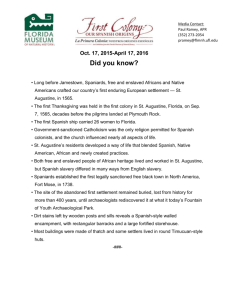

![Medieval Europe [1000-1500]:](http://s3.studylib.net/store/data/007874335_2-d7638f4faf65156dfdcac29a09a00993-300x300.png)
